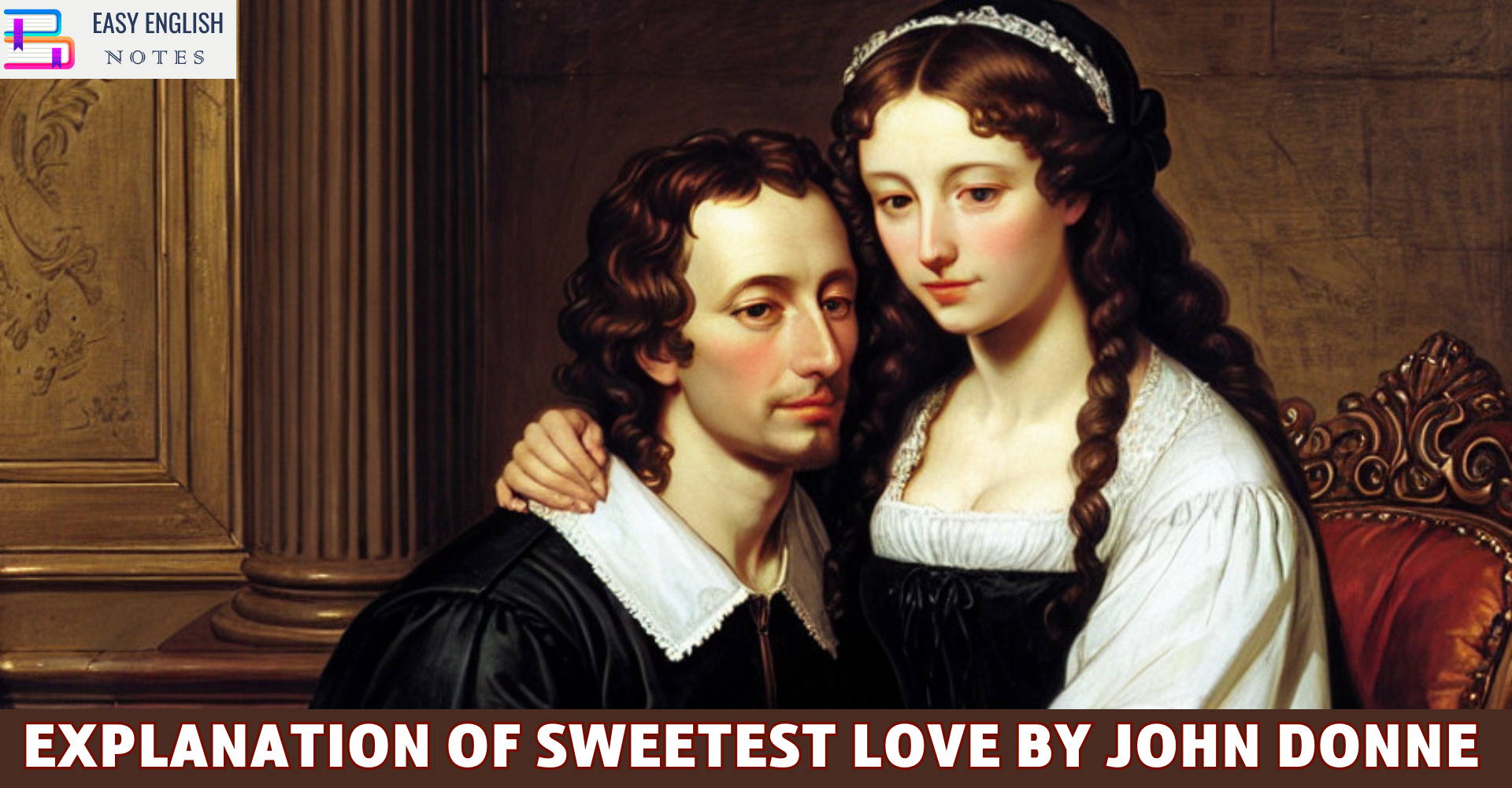But since that I
Must die at lost, tis best
To use myself in jest
Thus by feign’d deaths to die.
These lines have been taken from “Sweetest Love, I Do not Go”. This poem has been composed by John Donne. John Donne is one of the leading poets of the seventeenth century. He is the leader of the metaphysical school of poetry. He has composed both amorous and religious poems. The present poem is one of his representative amorous poems.
The given lines form the concluding four lines of the first stanza of the poem. In these lines the poet says that to live in separation from his beloved will be for him like death in life. As such he wants to live in separation from her for a while and feel the pangs of death. For it is certain that Death will certainly separate them one day. The poet therefore wants to have the experience of death in this very life. He explains to his beloved that this is the reason for his wishing to go away from his beloved for a while.
The given lines are remarkable for their metaphysical wit and conceit.
But believe that I shall make
Speedier journeys, since I take
More wings and spurs than he.
These lines have been taken from “Sweetest Love, I Do not Go”. This poem has been composed by John Donne. He is one of the leading poets of the seventeenth century. He is the leader of the metaphysical school of poetry. He has composed both amorous and religious poems. The present poem is one of his representative amorous poems.
The given lines form the concluding four lines of the second stanza of the poem. The poet makes a promise to her beloved that he will surely return back to her and he will return back very soon. He presents the example of the sun in support of his promise. He says that every evening the sun goes down in the western horizon but every morning he without fail, appears on the eastern horizon. For doing this he has to travel a distance of half of the globe. And he does so even when he has nobody to ask him to do so. On the other hand the poet has not to travel such a long distance. Moreover he has his beloved whose love will be constantly spurring him to return back to her soon. So it is certain that the poet will complete his journey speedily and return back to her.
Also Read :
- Compare Hamlet with Macbeth, Othello and other Tragedies
- “The Pardoner’s Tale” is the finest tale of Chaucer
- Prologue to Canterbury Tales – (Short Ques & Ans)
- Confessional Poetry – Definition & meaning
The given lines are remarkable for their metaphysical wit and conceit.
O how feeble is man’s power
That if good fortune fall,
Cannot add another hour,
Nor a lost hour recall!
But come bad chance,
And we join to’ it our strength,
And we teach it art and length,
Itself o’er us to advance.
These lines have been taken from “Sweetest Love, I Do not Go” This poem has been composed by John Donne. He is one of the leading poets of the seventeenth century. He is the leader of the metaphysical school of poetry. He has composed both amorous and religious poems. The present poem is one of his representative amorous poems
The given lines form the third stanza of the poem. In this stanza the poet beautifully and poetically presents a general truth of human life. It is a fact that we cannot increase our hours of real happiness even by a single moment. The moments of real happiness in our life are few and far between. We cannot add a single moment to their fixed number. But when bad days come upon us they seem to grow in number. Our sorrowful days seem to be never-ending, we lengthen them without tears. By our sorrowful mood, dejection and depression we only deepen our unfortunate. The poet mournfully reminds us that we are too weak to recall or recreate the moments of happiness and to ward off the moment of sorrow and troubles..
These lines are remarkable for giving poetic and vivid expression to the poet’s deep experience of life.
Let not thy divining heart
Forethink me any ill,
Destiny may take thy part,
And may thy fears fulfil.
These lines have been taken from “Sweetest Love, I Do not Go”, This poem has been composed by John Donne. He is one of the leading poets of the seventeenth century. He is the leader of the metaphysical school of poetry. He has composed both amorous and religious poems. The present poem is one of his representative amorous poems.
The given lines form the first four lines of the concluding stanza of the poem. The poet implores his beloved not to think of the possibility of any accident happening to him in his absence. Sometimes it so happens that destiny puts into action what is just thinking about. And therefore the poet requests his beloved not to have any fear about him in his mind otherwise destiny may by chance translate that fear into reality. In such a case real havoc will be done to the poet.
These lines are remarkable for the sincerity of their feelings and the forcefulness of their expression.
PLEASE HELP ME TO REACH 1000 SUBSCRIBER ON MY COOKING YT CHANNEL (CLICK HERE)











